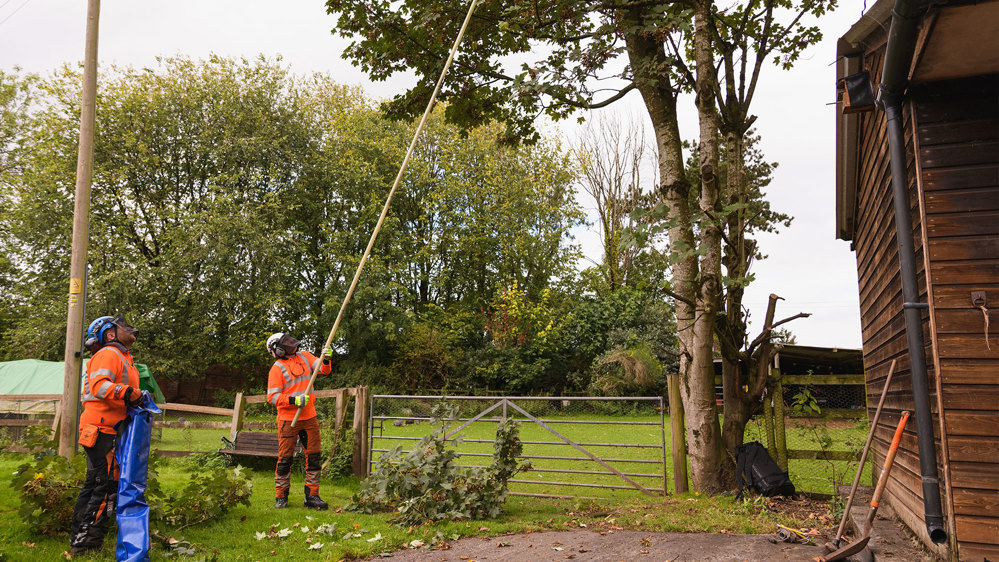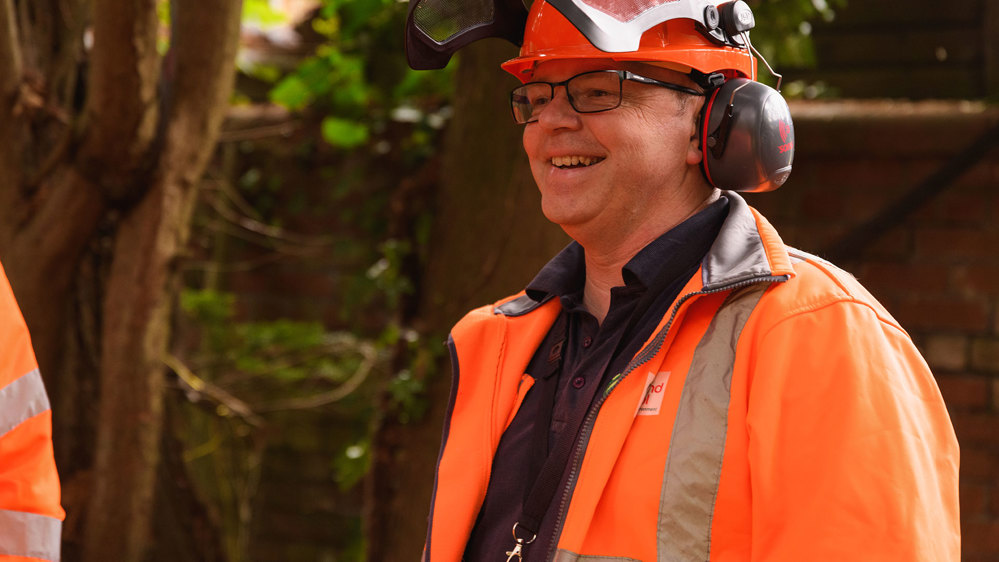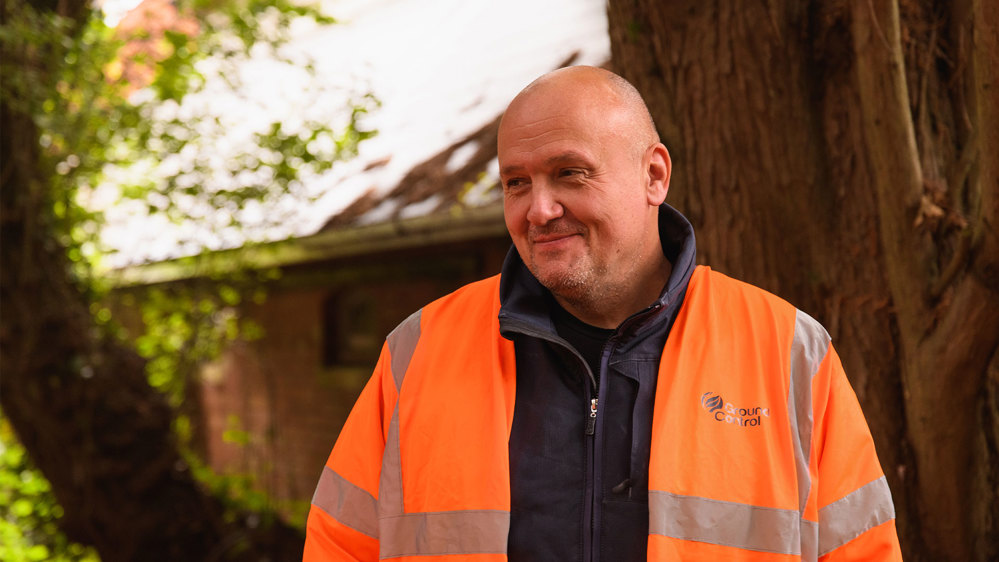Up close with Utility Arboriculture

What is Utility Arboriculture?
Utility arboriculture is a form of tree surgery and management of vegetation by power lines, telecommunication networks, and waterways.
Utility arborists prune, fell, and remove trees and vegetation near power lines and other electrical equipment. They can also be known as electrical foresters or utility tree trimmers.
Protecting power lines and critical network infrastructure
Ground Control works for Distribution Network Operators (DNOs) across the country, maintaining a critical network infrastructure as a legal requirement.
Safety first

Utility arborists must be trained to UA standards and receive accreditation to ensure they can perform the job to the optimum safety standard. It is essential that power continues to flow safely into buildings and infrastructure and that all people on-site or close by are safe and protected.
Ground Control's commitment to safety is certified through being awarded the RoSPA Presidents Gold Award on 14 consecutive occasions.
Protecting wildlife

Although Utility Arboriculture can happen any time of the year, there is a legal obligation to protect all UK species. Arborists will assess the vegetation for nests and habitats, and when necessary, work with ecologists to implement habitat management programs such as relocating or implementing exclusion zones around the protected areas.
Methods used
- Manual rodding
- Climbing and cutting
- Chainsaw operations
- Tree MEWP (Mobile Elevated Work Platform) work
- Tree trimming and rodding
- Tree chipping and recycling
Meet Team South Wales

We met Contract Delivery Manager Mike Corran, Team Leader (Team Three) Adrian Evans, Cimber (Team Four) Rhydian Jones, and Arborist (Team Three) Daniel Davies.
They worked together on an LV live job, cutting leaves and branches away from the power lines.
A Day on the Tools
Mike Corran, Contract Manager gave a running commentary on the tree and vegetation powerline clearance on a working site in South Wales for a National Grid contract.
The cutting project involved climbing and MEWP (Mobile Elevated Work Platform) work on a low-voltage site where some ABC cable had been cleared.
Adrian Evans ascends from the elevated work platform to cut the branches close to the powerlines for the MEWP work. Adrian has specialist training and additional precautionary PPE, required for the MEWP work as this allows the arborist to get closer to the powerlines to clear and maintain a clearance without needing to switch off the power.

An aerial rescue person is always on site ready to go, and team members are also trained for MEWP rescuing if ever needed.
On the other side of the site, Rhydian Jones and Daniel Davies worked on the climbing and cutting project.

They began by clearing the line zones with rods before climbing the tree. To get safety clearance around the powerlines, rods are used from ground level to clear a no-fly zone.

Rhydian then climbs the tree, making the clearance around the live zone.

To ensure safety is considered at all times, the climber has two lifelines, so, if one system fails, there’s a backup system that won’t allow him to fall. He will always be restrained within the tree. Before he swaps those over, he will put in a third system with anchor points, to ensure that he cannot fall out of the tree, no matter what happens.
When his third positioning system is in place, he transfers one of the redundant systems to a better, more suitable cutting point.

The arborist can then begin the cutting job and move anchor points if needed to get better clearance.
Handsaws are used in situations where chainsaws are not suitable. In this example, Rhydian used a handsaw for small, intricate cutting that requires holding branches.
Rhydian continues to transfer anchor points, using a flip line for a short-term secondary anchor point while he puts in another high point. He can then transfer his weight before he enters the cutting zone.
All cut branches and debris are then put through the chipper that is located onsite to clear the work area and recycle the debris to be used as bark chippings and mulch.

Working for Ground Control as a utility arborist

Climber Rydian Jones on a typical working day says:
Team Leader Adrian Evans on what he likes best about Utility Arboriculture:
Daniel Davies commented:
Ground Control training
Depending on the person and their natural ability, powerline tree work can normally take 12 to 18 months for somebody who's considered experienced in all the various aspects of powerline tree work.
There is a series of tickets to go through to become a fully qualified arborist, especially with the power lines and the chainsaws.
But this is covered by Ground Control who will put you through all your accreditation training.
A natural level of fitness and upper body strength is needed for climbing work.
All your training and courses are given to you while you are at work.
There are alternative roles to working at height, such as a groundsman, with gradual progression towards tree surgery and arboriculture.
Meet Mike Corran, Contract Delivery Manager, South Wales

Mike has worked for Ground Control since 2014 and has covered various aspects within Ground Control, including tree power-line clearance, water management on Canals & Rivers Trust, and Inland Drainage Boards.
Mike has also worked for Western Power, National Grid, and SSE.
Mike is currently managing the teams and their program of work for delivery for National Grid.
As Contract Delivery Manager, Mike plans to get a work program completed within any given year which involves somewhere in the region of 12,000 individual spans of work, that have to be cut to a specific clearance and contract specification and also make sure that it remains compliant within our four-year contract.
This work involves me running a 15-man directly employed workforce. Some of those are project managers and some of those are field teams and some are in the region of 20 contractors.
On working for Ground Control Mike commented:
Meet John Addis, the field team recruitment manager for the UK and Ireland

Jon has worked for Ground Control since the start of 2021, previously as a CDM. He has a good background in UA from an operational and management point of view.
Jon’s current role encompasses bringing new teams to Ground Control across the UK and Ireland in all of our contracts for various electricity and utility providers
As a dedicated UA resourcing manager, Jon is looking for teams that fulfil the roles available for the many contracts that Ground Control has successfully won or renewed. These would typically be small, self-employed arborist businesses probably up to 4 to 5 people dedicated to representing Ground Control full-time to help grow the contracts while continuing to operate their businesses.
On the benefits of joining Ground Control as a Utility Arborist Jon commented:
Discover more about Utility Arboriculture
Speak to usArboriculture

Ground Control to help keep Britain’s railways safe, resilient, and sustainable

Ground Control fundraising for Help for Heroes begins




